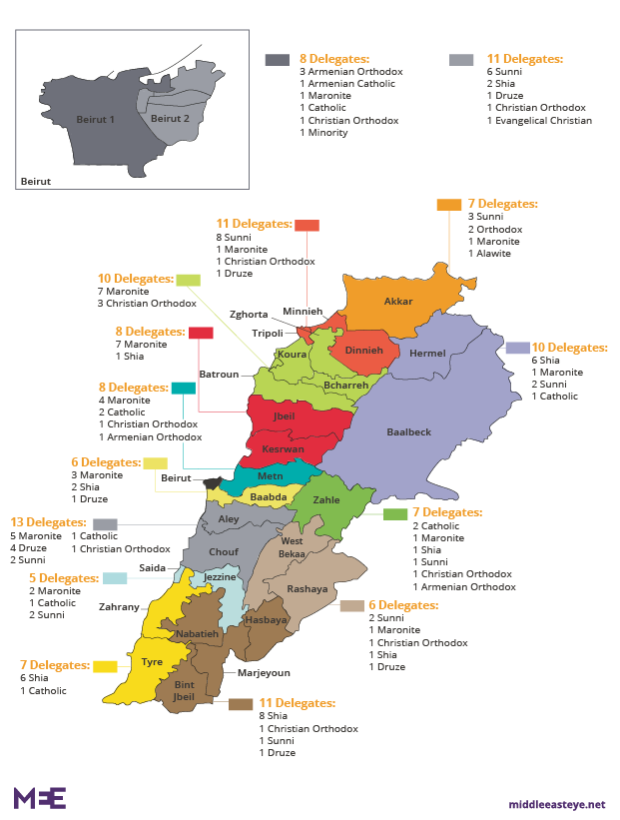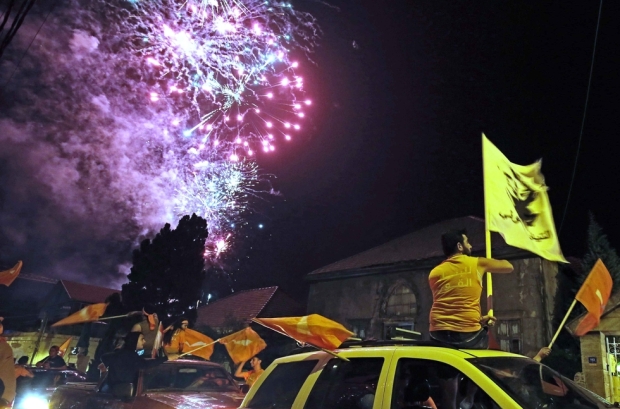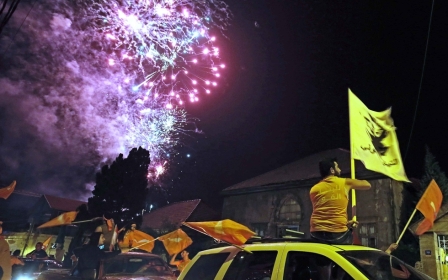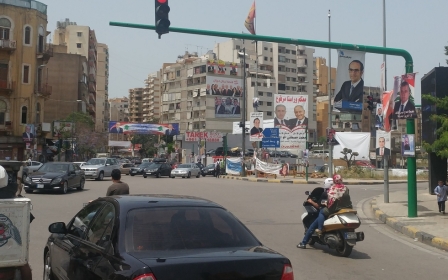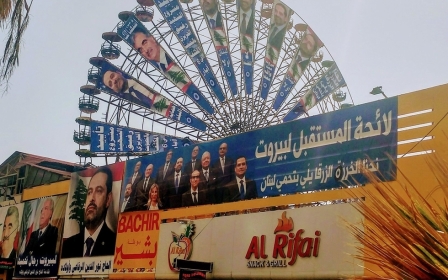Lebanon election: Hezbollah strengthened, Hariri weakened
Hezbollah emerged strengthened from the Lebanese parliamentary elections on Monday, with preliminary results showing the party and its allies won just over half the seats.
The “Party of God”, which is backed by Iran, made marginal gains in Lebanon’s first parliamentary elections for nine years, but has been boosted by the poor showing of its main rival, the Future Movement.
Candidates supported by Hezbollah or allied to it gained in major cities, winning just over half the seats in parliament, according to final results from all but one of Lebanon's 15 electoral districts.
Prime Minister Saad Hariri, head of the Future Movement, said on Monday his party had lost a third of its seats. "We were betting on a better result and a wider bloc with better Christian and Shia representation," he said.
The leader of Hezbollah, Sayyed Hassan Nasrallah, said that the election vindicated his party's actions, a clear reference to its involvement in the war in Syria and weapons stockpile which it says is a deterrent against Israeli invasion, and called the result "a very big political, parliamentary and moral victory for the choice of resistance".
This is a great political and moral victory for the resistance
- Sayyed Hassan Nasrallah, Hezbollah leader
The result is likely to cement Hezbollah’s role in the Lebanese government as the strongest political power in the country. Longer term, it could affect Lebanon’s chances of securing much-needed aid and loans from the United States and the international community.
Several Western countries, including the US, have designated Hezbollah’s military wing or the entire organisation as a terrorist group.
Hariri loses out
The election’s real loser was Hariri, who is expected to remain in office and whose Future Movement is likely to be the largest party in parliament despite suffering losses.
In post-election remarks on Monday, the prime minister said the Future Movement had won 21 seats at the polls, down from 33 in the previous parliament.
Lebanese daily Al-Akhbar, which is staunchly pro-Hezbollah, described the election as “a slap” for Hariri on its front page.
Late on Sunday night Hezbollah supporters in central Beirut planted their flags on a statue of Hariri’s late father, former prime minister Rafic Hariri, whose assassination is widely believed to have been carried out by the Shia group.
According to a Reuters calculation based on preliminary results for nearly all seats, Hezbollah and its political allies such as the Amal Movement and Free Patriotic Movement have won 67 out of the parliament’s 128 seats.
Speaking ahead of the final results, Lebanese political analyst Lokman Slim told Middle East Eye that Hezbollah’s control over its newly expanded bloc will be the decisive factor in the next parliament.
“The parliamentary bloc that Hezbollah will be able to control will not be confined to the 27 Shia MPs, it will be constituted of the 27 Shia MPs and their allies in other communities,” he said.
“On the one hand we will have a very strong bloc with one political agenda, while on the other hand several groupings with various agendas which are not always cohesive.”
“This will make the strength of Hezbollah at the very end. It’s not the number of seats Hezbollah will get, but the control that Hezbollah will have over the bloc it will be controlling,” he added.
It’s not the number of seats Hezbollah will get, but the control that Hezbollah will have
- Lokman Slim, political analyst
Hariri struggled against Hezbollah-backed Sunni candidates in his party’s strongholds of Beirut, Saida and Tripoli.
Other Hezbollah allies emerging victorious include Jamil al-Sayyed, a Shia former intelligence chief and ex-general, who has strong ties to Syrian President Bashar al-Assad’s government and was a prominent figure during Syria’s 1976-2005 occupation of Lebanon.
Delegates before the election
In Tripoli, where several prominent Sunni politicians were vying to claim leadership of the city, Faisal Karame was elected to parliament for the first time. He is the scion of a famous political dynasty and son of late former prime minister Omar Karame, who was an ally of Damascus.Delays due to new law
The election was conducted using a highly complicated new proportional law, with final results delayed as a result. Interior Minister Nouhad Machnouk said the results will be announced on Monday.
President Michel Aoun is expected to address the country on Monday as well.
As part of Lebanon’s political system, seats in parliament are divided between the country’s 18 officially recognised sects. Lebanese politics is highly fractured and sectarian, and alliances and negotiations are expected to be worked out after the dust has settled.
Among the Christians, the right-wing Lebanese Forces party did particularly well, appearing to almost double its number of seats from eight to 15.
The other heavyweight Christian party, Aoun’s FPM, is projected to win 17 seats, which would make Foreign Minister Gebran Bassil an MP for the first time. Bassil fell short in Lebanon’s last elections in 2009.
The Progressive Socialist Party of Druze leader Walid Jumblatt is expected to win nine MPs. Jumblatt stepped aside for his son Taymour Jumblatt in this election, but still largely controls the party.
Christian parties the Marada Movement and the Kataeb Party are on course to finish with three MPs each.
Opponents of the traditional political class were hopeful the new electoral law would open the door for independent, civil society candidates. Preliminary results showed two from the Kollouna Watani coalition, Paula Yacoubian and Joumana Haddad, gaining seats in Beirut.
However, Haddad's seat was taken away from her in dramatic fashion, with election officials claiming an error had seen her declared victor.
The self-confessed atheist running for a Christian seat and her supporters cried foul play, with hundreds of protesters convening outside the interior ministry calling for transparency.
"All the campaigns were unanimous in their projection that I won, so what happened overnight? There was consensus that Kollouna Watani won two seats," Haddad told Lebanese daily Annahar.
"Where did the second one disappear to? I leave this reality with the president of the republic, the interior ministry and public opinion. I retain my right to legally challenge the results."
I retain my right to legally challenge the results
- Joumanna Haddad, Kollouna Watani candidate
Turnout for the polls was disappointing. Lebanese were able to vote for their MPs for the first time in nine years, after parliament extended its term three times citing concerns over security and the old electoral law.
This did not translate into widespread enthusiasm for the electoral process, however, with voter turnout standing at just under 50 per cent.
Hariri said confusion over the new electoral process was behind the poor turnout.
"The problem with this election was a lot of people didn't understand it," he said.
Middle East Eye propose une couverture et une analyse indépendantes et incomparables du Moyen-Orient, de l’Afrique du Nord et d’autres régions du monde. Pour en savoir plus sur la reprise de ce contenu et les frais qui s’appliquent, veuillez remplir ce formulaire [en anglais]. Pour en savoir plus sur MEE, cliquez ici [en anglais].


